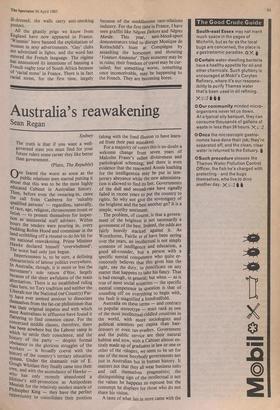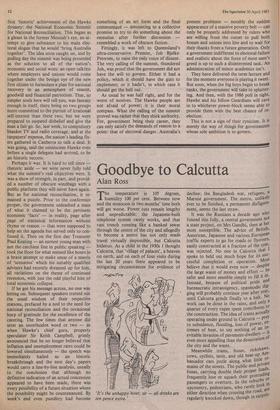Australia's reawakening
Sean Regan
Sydney The truth is that if you want a well- governed state you must find for your future rulers some career they like better than government.
(Plato, The Republic) One feared the worst as soon as the public relations men started putting it about that this was to be the most highly educated Cabinet in Australian history. Then, before even the swearing-in, came the call from Canberra for 'suitably qualified persons' — regardless, naturally, of race, age, religion, chromosome count or fetish — to present themselves for inspec- tion as ministerial staff advisers. Within hours the tenders were pouring in, every budding Robin Hood and commissar in the land scribbling off a résumé to do his bit for the national reawakening. Prime Minister Hawke declared himself 'overwhelmed'. The worst had only just begun. Imperiousness is, to be sure, a defining characteristic of labour politics everywhere. In Australia, though, it is more or less the movement's sole raison d'être, largely because of the sheer awfulness of the main alternatives. There is no established ruling Class here, no Tory tradition and neither the Liberals nor the National (ne Country) Par- ty have ever seemed anxious to dissociate themselves from the fat-cat philistinisrn that was their original impetus and with which most. Australians in affluence have found it flattering to find common cause. For the Concerned middle classes, therefore, there has been nowhere but the Labour camp in Which to settle their conscience, and the history of the patty — despite formal obeisance to the glorious struggles of the Workers — is broadly coeval with the history of the country's tertiary education system. Under the shamanic rule of E. Gough Whitlam they finally came into their Own, and with the ascendancy of Hawke Ito has only recently abandoned a lifetime's self-promotion as Antipodean Messiah for the relatively modest mantle of Philsopher King — they have the perfect °PPortunity to consolidate their position
(along with the fond illusion to have learn- ed from their past mistakes).
For a majority of voters this is no doubt a welcome change from seven years of Malcolm Fraser's sullen divisiveness and pathological scheming; and there is even evidence that the renowned Aussie loathing for the intelligentsia may be put in tem- porary abeyance while the new administra- tion is allowed to find its feet. Governments of the dull and second-rate have signally failed in recent years to put the country to rights. So why not give the sovereignty of the brightest and the best another go? It is a simple, worthy sentiment.
The problem, of course, is that a govern- ment of the brightest is not necessarily a govenment of the best. Indeed, the odds are fairly heavily stacked against it. As Worsthorne, Fairlie et al have been saying over the years, an intellectual is not simply someone of intelligence and education, a good all-rounder, but a person with a specific mental competence who quite er- roneously believes that this gives him the right, nay the duty, to pontificate on any matter that happens to take his fancy. That is bad enough, in general; but when — as is true of most social scientists — the specific mental competence in question is that of sounding off on everything to begin with, the fault is magnified a hundredfold.
Australia on these terms — and contrary to popular stereotype — must rank as one of the most intellectual-riddled countries in the world, with more sociologists and political scientists per capita than hair- dressers or even tax-evaders. Government and the public service are their natural habitat and now, with a Cabinet almost en- tirely made up of graduates in law or one or other of the -ologies, we seem to be set for one of the most busybody governments not just in Australian but in human history. It matters not that they all wear business suits and call themselves pragmatists; the distinguishing sign of the intellectual is not the values he happens to espouse but the contempt he displays for those who do not share his vision.
A taste of what lies in store came with the first 'historic' achievement of the Hawke dynasty: the National Economic Summit for National Reconciliation. This began as a gleam in the former Messiah's eye, an at- tempt to give substance to his main elec- toral slogan that he would 'bring Australia together'. The idea soon caught on, and by polling day the summit was being presented as the solution to all of the nation's economic and social woes: an open talkiest where employers and unions would come together under the benign eye of the new first citizen to formulate a plan for national recovery in an atmosphere of reason, goodwill and financial patriotism. That, so simpler souls here will tell you, was fantasy enough in itself, there being no two groups more committed to the pursuit of irrational self-interest than these two; but we were prepared to suspend disbelief and give the man a fair go. So, last week, to compulsory blanket TV and radio coverage, and at the taxpayers' expense, the nation's leading fix- ers gathered in Canberra to talk a deal. It was going, said the omniscient Hawke even before a single delegate had arrived, to be an historic success.
Perhaps it was. It is hard to tell since rhetoric aside — we were never fully told what the summit's real objectives were. It was a show of strength, in part, and provid- ed a number of obscure windbags with a public platform they will never have again. But as for national reconciliation, it re- mained a puzzle. Prior to the conference proper, the government unleashed a mass of what it claimed to be the pertinent economic 'facts' — in reality, page after page of statistical information without rhyme or reason — that were supposed to help set the agenda but served only to con- found it. Then on the first day Treasurer Paul Keating — an earnest young man with not the catchiest line in public speaking took the floor for what seemed like hours in a brave attempt to make sense of a matrix of `scenarios' which his suitably qualified advisers had recently dreamed up for him, all variations on the theme of continued recession, with just the odd playful hint of total economic collapse.
If he got his message across, no one was letting on. Subsequent speakers trotted out the usual wisdom of their respective stations, prefaced by a nod to the need for national reconciliation and the occasional burp of gratitude for the excellence of the catering. The few times that anyone did utter an unorthodox word or two — as when Hawke's chief guru, property speculator Sir Keith Campbell, grimly announced that he no longer believed that inflation and unemployment rates could be lowered simultaneously — the speech was immediately hailed as an historic breakthrough and the next day's papers would carry a line-by-line analysis, usually to the conclusion that although no definitive indication of an actual concession appeared to have been made, there was every possibility of a future situation where the possibility might be countenanced. By week's end even punditry had become something of an art form and the final communique — amounting to a collective promise to try to do something about the recession after further discussion resembled a work of obscure fiction.
Fittingly, it was left to Queensland's ultra-conservative Premier, Joh Bjelke- Petersen, to raise the only voice of dissent. The very calling of the summit, thundered Joh, was proof that the government did not have the will to govern. Either it had a policy, which it should have the guts to implement; or it hadn't, in which case it should get the hell out.
As usual he was half right, and for the worst of motives. The Hawke people are not afraid of power; it is their moral compass. What the calling of the summit proved was rather that they shirk authority. For, government being their career, they can only satisfy the demands of reason to a point: that of electoral danger. Australia's
present problems — notably the sudden appearance of a massive poverty belt — can only be properly addressed by rulers who are willing from the outset to pull both bosses and unions into line and to wait for their thanks from a future generation. Only a government indifferent to electoral failure and realistic about the force of most men's greed is up to such a disinterested task. An administration of minor academics isn't.
They have delivered the term lecture and for the moment everyone is playing it sweet. But soon, when the big boys begin to break ranks, the government will take to splutter- ing. And then, with the 1986 poll in sight, Hawke and his fellow Guardians will cave in to whichever power-block seems able to provide them with the best chance of re- election.
This is not a sign of their cynicism. It is merely the way of things for governments whose sole ambition is to govern.











































 Previous page
Previous page